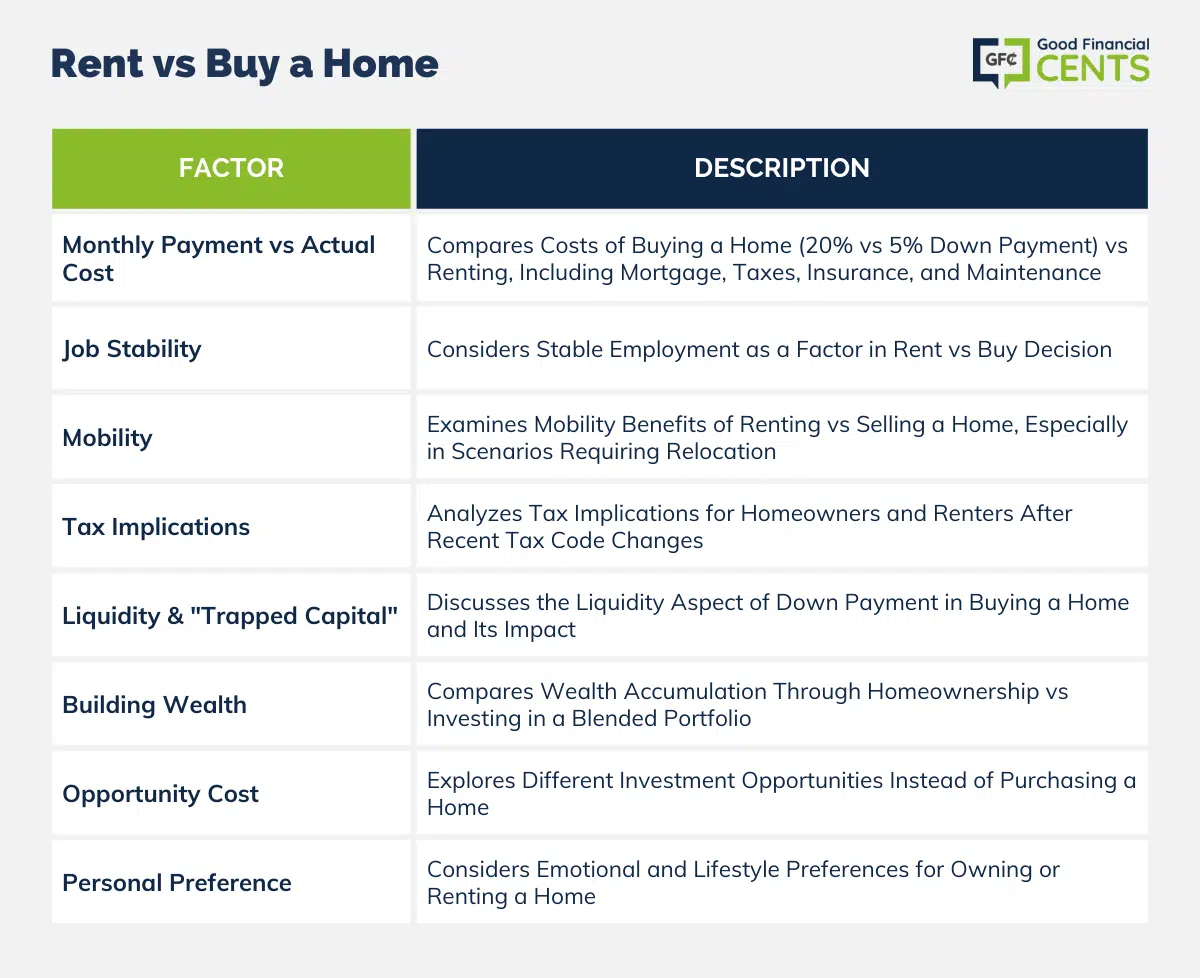The rent vs buy-a-home debate is an ongoing one that seems to rise and fall with property values.
With house prices now sitting at record levels, the debate is more relevant than ever.
This is especially true in high-priced markets, where house prices have reached nosebleed levels and will require a massive financial investment – if that’s even possible.
Table of Contents
First Things First: Where You Live Figures Into the Rent vs Buy Decision
It shouldn’t come as a surprise that geography plays a major role in the rent vs buy-a-home decision.
In some markets, with either very high house prices or an abundance of rental housing, renting will be the better choice. But in others, where rents are higher than a typical house payment, buying stands out as the preferred strategy.
A CNBC report this year, It’s better to rent than to buy in today’s housing market, disclosed that buying a home is now cheaper than renting. They report that renting is a better investment than buying in 50 metropolitan areas in the US.
Metropolitan areas where it’s better to rent include Atlanta, Dallas, Denver, Houston, Los Angeles, Miami, San Francisco, and Seattle. However, buying outperforms renting in much of the Midwest and Northeast, with Chicago and Cleveland being the best places to buy.
San Francisco is a classic case in point. As of the middle of this year, the median sale price of a single-family home reached an incredible $1.4 million dollars and $1.2 million for condos. Buying at those price levels may be out of the question for the great majority of households.
By contrast, the median price of a house in Buffalo is $208,000, versus an average monthly rent of $1,000. Numbers like that make owning a better investment than renting since the monthly payment for the median-priced home will be below the average monthly rent.
If You Don’t Qualify for a Mortgage, Then It Doesn’t Matter
This is another fundamental fact of life when it comes the homebuying.
Simply put, the rent vs buy a home question doesn’t apply if you can’t qualify with a mortgage lender for the financing.
This can include several factors, including:
- Insufficient or unstable income
- Bad credit history
- Excessive non-housing debts and obligations
- Lack of funds for a down payment
In the meantime, though, we’re going to focus this debate on the rent vs buy question with the assumption that you do have the financial resources to buy.
Rent vs Buy a Home: Which Is Better for You?
There are a lot of factors that go into the rent vs buy-a-home decision. Not all have to do with money, either.
Below, we’ll break down each factor individually, discuss the details of how it affects renting or owning, and then attempt to declare a winner in each category.
Monthly Payment vs Actual Cost
This one may be the most complicated of all. If you purchase a house for $300,000, with a $60,000 down payment (20%), you’ll need a mortgage of $240,000. At 4% for a 30-year loan, the monthly mortgage payment will be $1,145.
Property taxes, at $3,000 per year, will add another $250 to your monthly payment. You should also figure an additional $100 for homeowner’s insurance.
That will bring the total monthly cost to buy to $1,395.
If the cost to rent the same house is $1,800 per month, buying will certainly be the better choice.
But let’s say instead of making a 20% down payment, you go in with only 5%. That will increase your mortgage to $285,000. At 4% for a 30-year loan, the mortgage payment itself will be $1,360. You’ll also need to add $350 for property taxes and homeowner’s insurance, bringing the total to $1,710.
But that’s not the end of the story. By putting 5% down, you’ll be required to pay private mortgage insurance. The monthly premium of $285,000, which represents 95% of the value of the house, will add about $185 to the payment.
That will bring the total monthly cost to buy up to $1,895.
But there’s one more variable for owners: repair and maintenance costs.
HGTV reports that average annual repair and maintenance costs for homeowners are between 1% and 3% of the home’s purchase price. For a house bought for $300,000, using the midpoint of 2%, the repair and maintenance costs come to $6,000 per year. That will add about $500 to your monthly payment, whether you put down 5% or 20%.
With a 20% down payment, the monthly payment then rises to $1,895. With a 5% down payment, it rises to $2,395.
Winner: Renting
Job Stability
This is an often under-appreciated rent vs buy criteria. If you have a very stable job or you work in a very stable career field, buying can make more sense. But if like many occupations today, future employment is uncertain, you may be better off renting.
Part of the problem with unstable employment is income reliability. If you change jobs frequently, there’s a real possibility that, at some point, you’ll be earning less than you did when you first bought your home. If that even potentially describes your situation, renting is the better course.
Winner: Buying for those with stable employment, renting for all others.
Mobility
This is looking at the job stability situation from a different angle. If you live in a small city or rural area, and jobs in your field are scarce, you may need to relocate if you lose your job.
Another example is where you may be getting married in the near future, requiring relocation. Still, another possibility is an ailing loved one in another city that may require you to make a move at some point.
In any of the above situations, renting will give you the needed mobility to make a move with the fewest hassles. You can get out of a lease at the end of the term at the latest, and some will allow you to break the lease at minimal cost. But trying to sell a home to make a move is not only more time-consuming, but if you need to move quickly, you may lose money on the sale.
Winner: Renting
Tax Implications
There was a time when the tax code was extremely homeowner-friendly. However, the tax code changes implemented at the end of 2017 changed that equation for millions of homeowners.
First and foremost, the standard deduction increased dramatically. For 2019, it’s $24,400 for married filing jointlyand $12,200 for single filers.
Continuing our example from above, if you have a $240,000 mortgage at 4%, you’ll pay mortgage interest of something under $9,600 in the first year of the loan. Even if you add in $3,000 for real estate taxes, you’re only up to $12,600 in tax-deductible expenses related to your home.
That may give you a slight deduction – $200 – if you’re single. But it’ll barely exceed 50% of the standard deduction for a married couple.
There’s another limitation in the new tax code as well. State and local tax (“SALT”) deductions are now limited to $10,000 per year. If you live in a high-tax state, your real estate tax deduction will be capped, denying you the full benefit of the expense deduction.
Winner: Buying, as long as you have large itemized deductions apart from your home. Otherwise, the win goes to renting.
Liquidity & “Trapped Capital”
Money invested in the down payment on a house is effectively trapped capital. That’s because it can’t be accessed, apart from selling the home or taking out a home equity loan. One is entirely inconvenient, and the other adds to the cost of owning. The takeaway, however, is that down payment money is not liquid. It’s there, but it’s really not.
Let’s take an example of two people, each of whom has $60,000 in savings. The first takes the entire amount and uses it as a 20% down payment on a $300,000 house. The second keeps it in savings and rents her home.
By investing his savings and a house, the buyer has lost liquidity. But by retaining $60,000 in savings, the renter remains completely liquid. Because of that liquidity, the renter has more options in life, as well as a generous cushion against financial uncertainty.
Winner: Renting, if liquidity is important to you – and it should be.
Building Wealth
There are a lot of variables with this factor, but let’s take renting and buying individually.
Person A puts the $60,000 down payment on a $300,000 house and faithfully makes the mortgage payments for 30 years. At the end of that time, not only is the mortgage paid in full, but the house has doubled in value. Person A has grown his wealth from $60,000 to $600,000 in 30 years.
Person B also has $60,000, but instead of buying a house, she invests it in a blended portfolio of stocks and bonds, with an average annual rate of return of 7%. After 30 years, her $60,000 portfolio has grown to $456,735.
Person A nets an advantage of more than $153,000 as a result of buying rather than renting. However, if his house doesn’t rise in value, his net worth will be only $300,000 after 30 years. That will put him behind by more than $156,000.
Winner: It could go either way, depending on the price performance of the homeowner’s house versus the savings and investment commitment of the renter.
Opportunity Cost
We just did an example of how a person can choose to invest money in a portfolio of stocks and bonds that would otherwise go toward the purchase of a home. That’s one form of opportunity cost that could go either for or against the homeowner.
But there are fewer opportunity costs. For example, if rather than buying a house, you choose to invest the money in your career or in buying a business, the increase in income – as well as the potential resale value of the business – could put you well ahead of the investment return on owning a house.
Self-made millionaire real estate investor Grant Cardone has stated many times that you shouldn’t buy a house to live in but instead rent, then invest your money in yourself. (He rents his home while owning a portfolio of income-producing rental properties.) Using the money to buy a business or improve your career skills is largely what he was referring to.
Winner: Renting
Personal Preference
This covers a wide range of potential topics that depend on your individual circumstances. For example, some people just feel better emotionally owning. They prefer the permanence of ownership – as well as the ability to customize their home – to any benefits that may be provided by renting.
Also, if you have children, it’s likely you’ll strongly prefer owning to provide them with a greater sense of security.
On the other hand, if you have a very demanding career, you like to travel, or you have hobbies and passions that don’t see you spending much time at home, renting may be preferred. It’s also the better choice for anyone who doesn’t want to get involved in the hands-on maintenance that owning a home requires.
Winner: It’s a certified toss-up.

Should YOU Rent or Buy a Home?
As you can see from the various factors we’ve evaluated in the rent vs. buy a home decision, it’s really a complicated choice.
It starts with the big picture factors, like the market you live in. If the area has particularly high housing costs, owning may not be an option, no matter how desirable it may be from an emotional standpoint.
There are also financial considerations, which tend to dominate the debate. First and foremost is the long-term financial advantage of owning versus renting. That really hangs mostly on the likelihood that house prices in your area will rise substantially in the future. That is, of course, a variable since it involves the use of a crystal ball that none of us have.
Then there are personal factors. First in that category is whether you can even afford to buy a house. That will depend on the strength of your finances against levels of affordability in your area.
You’ll also need to determine if owning will be a benefit from a tax standpoint, as well as the impact of variable costs, like repairs and maintenance.
Finally, there are issues of personal preference. As much as you may want to own a home, renting may better accommodate your lifestyle. If your occupation, hobbies, or traveling frequently keep you away from home, renting may be the better choice, even if other factors favor owning.
If you’re facing the rent vs. buy decision right now, carefully consider the choice against all the factors listed above. You may be surprised at your final conclusion.







